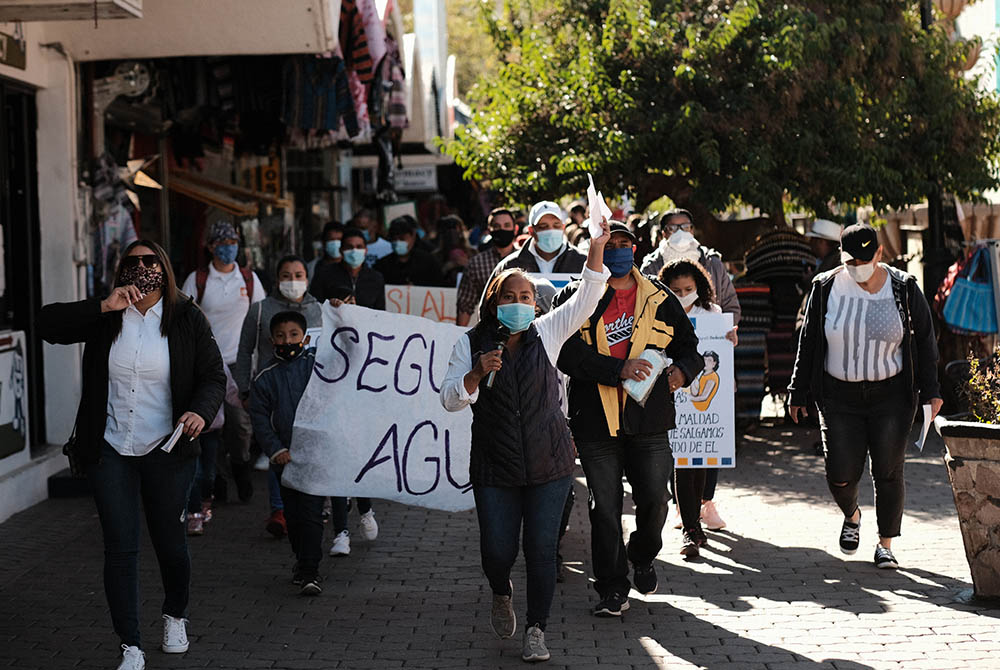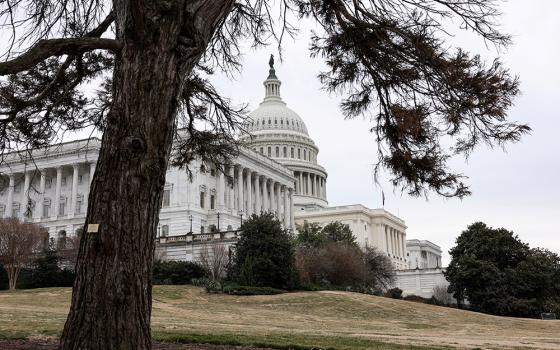
Migrant families participate Dec. 2 in the #SaveAsylum March through downtown Nogales, Sonora, Mexico. Their banner reads "Seguimos Agui" ("We're Still Here"). (Provided photo)
A little boy on the Mexican side of the border fence peers into in El Paso, Texas, on the U.S. side in this November 2017 photo. (CNS/Rich Kalonick, Courtesy of Catholic Extension)
Life teaches us that some things just take time. Six years into my formation as a Sister of Providence, for example, there are truths that have deepened in me about God that I simply couldn't internalize in my first year or two. After 18 years of speaking Spanish in different contexts, I have an ease in speaking that was not possible when I cracked open my first high school language books. Throughout our lives, we learn by experience the goodness of waiting that produces fruit. We learn that God's work might be slow, but it is constant.
This wholesome waiting is the kind we generally associate with Advent. It's the kind that puts butterflies in our stomach and anticipates the tastes, colors and sounds of Christmas. It's the kind that slowly melts wax on bright Advent candles and celebrates each day with the movement or opening of an Advent calendar. The stereotypical Advent waiting is the stuff of cookies baking while their smells waft through the house, and scarves taking shape with each knitted row.
Embarking on the journey of Advent this year, songs and reflections tug me along toward this idyllic waiting. But the truth is I'm tired of waiting. And some people have been waiting for way too long.
Often in religious contexts we romanticize waiting and paint it as a saint-making practice in patience and virtue. We imagine Mary the mother of Jesus sitting quietly in her house, rubbing her pregnant belly and pondering God's plan for her, with a shiny ring of light around her head. We don't think about the morning sickness, the swollen ankles or the fatigue. Those images don't look quite as nice on Christmas cards. And yet for most of us, the waiting for post-COVID-19 life and a new start in 2021 feels much more like the latter.
In recent years, I've done lots of wondering about how Christian leaders over time have twisted Jesus' subversive teachings into a doctrine that pacifies and subdues. Somewhere along the line, retelling tales of a man whose life inspired a revolution became a monotonous drone that puts us to sleep in cold hard pews on Sunday mornings. We sing the words of the song "O Come, O Come Emmanuel" with a gentle tune that does not match the dire plea that follows: And ransom captive Israel, that mourns in lonely exile here. Are we even aware, as we sing, that this song discusses captives and exile? I can tell you that this is the first time it has dawned on me.
This is a reality that would have thrown me into a frenzy just a year or six months ago.
The waiting has become part of the furniture here.
Sometimes in conversations with migrants waiting for asylum in Nogales, Sonora, Mexico, this pacifying theology comes to light. I hear a mom renting a room without heat or furniture in freezing temperatures say things like, "Cuando Dios quiere" ("when God wills it") or "El tiempo de Dios es perfecto" ("God's time is perfect"). I sit in Zoom meetings with immigration advocates strategizing about the transition to a Biden-Harris administration in January who say that we should not expect changes to happen from one day to the next; justice will take time. Sometimes I find myself repeating them.
We are now approaching a year since the "Remain in Mexico" policy was implemented here in Nogales, and people fleeing persecution were first sent back to wait across the border from the United States. As I look around, there is nothing calm and bright about this waiting. For families running out of resources and facing the dangerous vulnerability of being a migrant in transit at the border, this waiting is torture.
We know from history lessons that waiting can be a strategic tool of the oppressor. The Rev. Dr. Martin Luther King describes this tactic clearly: "For years now I have heard the word 'Wait!' It rings in the ear of every Negro with piercing familiarity. This 'Wait' has almost always meant 'Never.' " We must come to see, as King said in quoting an unattributed jurist, that "justice too long delayed is justice denied."
This year, as we wait for reparations and racial healing, COVID-19 test results, and just immigration reform, I've decided the lullaby sounds of "sleep in heavenly pe-eace" simply do not fit the collective Advent experience of humanity in 2020. Yes, God grants us the grace to do holy things in the waiting. But the waiting itself, as long as it denies justice, is not holy.
Maybe this year it's time to rewrite some tunes and paint new images of Advent waiting — images of the Holy Family unabashedly requesting the place of safe shelter that they deserve, and a door opening in response; songs that call for an end to unjust waiting. May we take up the tools to craft a new Advent interpretation, one that sounds and looks less like "Silent Night" and more like setting captives free.
[Tracey Horan is a member of the Sisters of Providence of St. Mary-of-the-Woods, Indiana. She is the education coordinator at the Kino Border Initiative in Nogales, Arizona, and Sonora, Mexico.]
Advertisement






